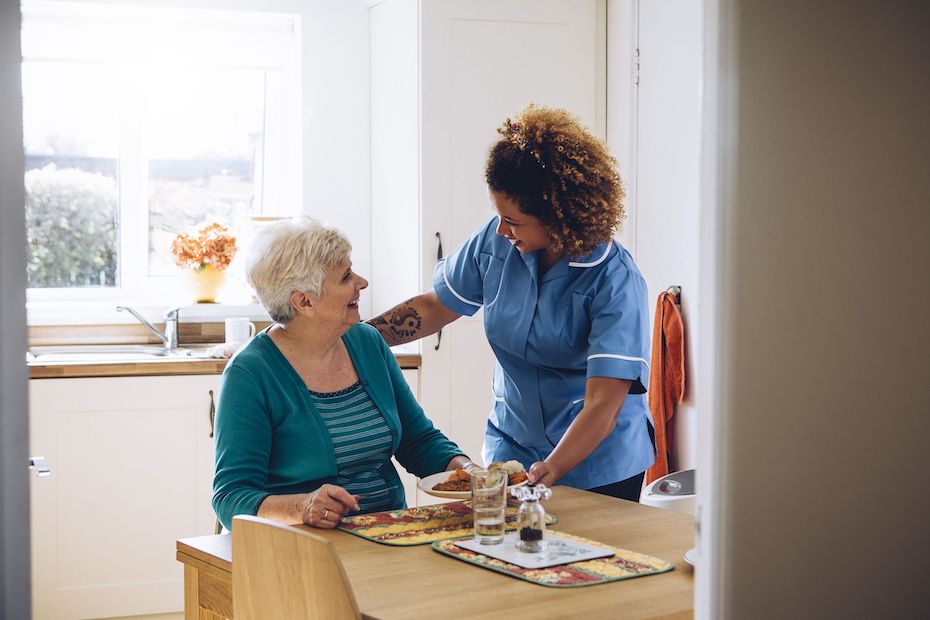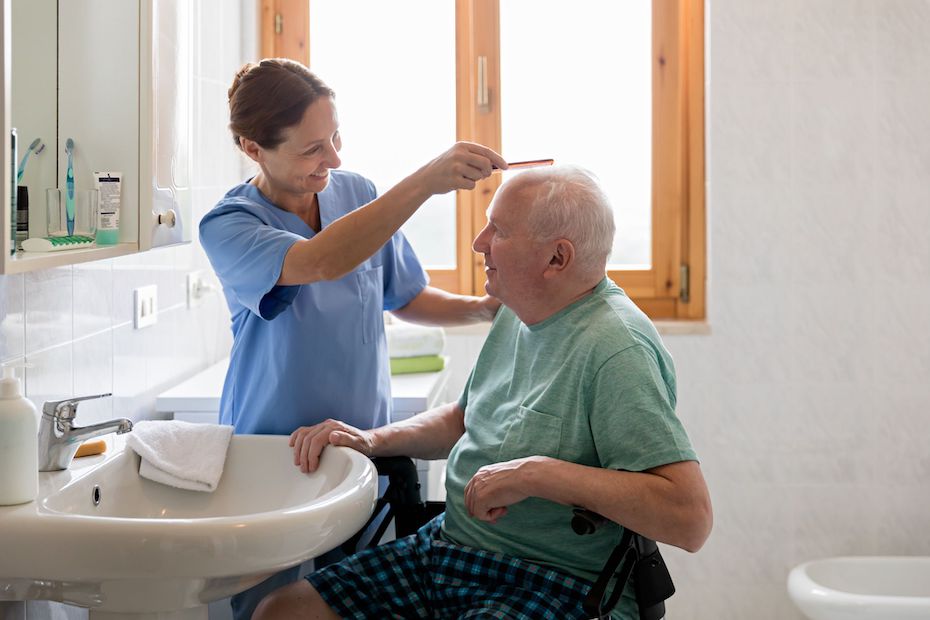Most people want to live at home for as long as they can, but illnesses and disabilities often make this challenging. One of the best ways to age in place is with personal care services at home. With in-home care, a trained aide provides medical and/or non-medical services in the comfort of your own home.
There are many benefits to private home care, like keeping your independence and staying close to friends and family. To help you understand your options, we’ve created a guide to medical and non-medical in-home care. Here we outline what is included in home health care. Let’s start by answering the question, “what is personal home care?”
Table of Contents
What is Personal Home Care?
Also known as non-skilled care, non-medical care, or companion care, personal care services at home allows you to live in the comfort of your own home for as long as possible. Remaining at home can provide you with an enhanced quality of life that you might not experience in other settings.
Personal home care is typically provided by trained aides, certified nursing assistants (CNAs), or therapists, depending on your needs. Because you’re at home, you’ll receive individualized care that’s focused solely on your needs. This can be a major differentiator from crowded skilled care facilities or rehabilitation centers.
Who Can Benefit from Personal Home Care?
Many people can benefit from personal home care services , regardless of their age or ability level. You’ll find a few examples below:
- Seniors looking for companionship or assistance with transportation
- People who are recovering from surgery
- Individuals with disabilities
- People who suffer from a chronic illness
- Primary caregivers looking for respite
Common Personal Home Care Services
Personal home care typically provides a variety of non-medical services, including:
- Assistance with activities of daily living (ADLs), like bathing, toileting, dressing, and grooming
- Basic housekeeping (cleaning, yard work, laundry, etc.)
- Preparing and/or delivering meals
- Companionship (reading aloud, playing games, chatting, etc.)
- Assistance with ambulation, transfer, and fall prevention
- Medication reminders
- Errands and appointment escorts
- Therapy and/or rehabilitative services

Obtaining Personal Home Care
Unlike some other types of care, personal home care doesn’t need to be prescribed by a doctor. If you decide personal care is right for you, you can use an agency to hire a caregiver or find one on your own. We’ve curated a list of the most important questions to ask an in-home provider before you decide if this is the right decision for you.
Paying for Personal Home Care
In most cases, personal home care is not covered by private health insurance or Medicare. In the majority of cases, it’s funded through private pay, Medicaid, or long-term care.
Some government programs offer assistance for personal home care expenses. And if you receive veterans benefits, they may also offset the cost of personal home care assistance.
What is Included in Home Healthcare?
Also known as skilled care, visiting nurse services, or clinical home care, home healthcare is provided by trained medical personnel. They have advanced, state-approved training and licensing, allowing them to offer in-home medical care.
A variety of people provide home healthcare, including trained aides, CNAs, occupational therapists, and physical therapists. Some caregivers may specialize in certain conditions, like Alzheimer’s disease or dementia. Registered nurses (RNs) or licensed practical nurses (LPNs) may offer home healthcare, but this is typically reserved for people with more serious conditions.
Who Can Benefit from Home Healthcare?
There’s no one-size-fits-all when it comes to skilled home care, and it can be modified to support your exact needs. Home healthcare is typically used to assist people who:
- Are recovering from a medical event, illness, or injury
- Need monitoring after a significant medication change
- Have just left rehabilitation, the hospital, or a skilled nursing facility
- Need physical or occupational therapy after an accident or illness
Common Home Healthcare Services
The extensive training undergone by home healthcare providers allows them to provide a wide range of medical services. You’ll find some of the most common below:
- Short-term nursing services
- Medical social work
- Physical therapy
- Occupational therapy
- Speech-language pathology
- Administering medications/injections
- Medication reminders
- Administering medical tests
- Monitoring vital signs
- Wound care
- Pain management
How Can I Get Home Healthcare?
Unlike personal home care, home healthcare must be prescribed by a doctor. Once you’ve created a plan with your medical team, you’ll receive care on a set schedule until you’ve met your health or recovery goals.

Paying for Home Healthcare
Because it’s prescribed by a physician, home healthcare is usually covered by Medicare or private insurance. If you qualify, it may also be covered under your veterans benefits or Medicaid.
What is Long-Term Nursing Care?
Like home healthcare, long-term nursing care is strictly medical in nature. It’s also known as home-based skilled nursing, long-term nursing care, or adult nursing. Long-term nursing care is typically reserved for people with chronic, debilitating illnesses, diseases, or disabilities.
Adult nursing is provided by RNs or LPNs due to their advanced medical training. Personal care aides aren’t qualified for long-term nursing care, since they don’t have the necessary medical skills. CNAs can provide some of the services associated with long-term nursing care, but not all of them.
Who Can Benefit from Long-Term Nursing Care?
Long-term nursing care is intended for people who cannot function on their own due to diseases or illnesses like:
- Multiple sclerosis (MS)
- Amyotrophic lateral sclerosis (ALS)
- Spinal cord injuries
- Traumatic brain injuries
Common Long-Term Nursing Care Services
Home-based skilled nursing includes many of the services below, among others:
- Catheter care
- Feeding tube care
- Tracheostomy care
- Ventilator care
- Colostomy/gastrostomy care
- Wound dressing
- Administering medications/shots
- Monitoring vital signs
Obtaining Long-Term Nursing Care
Long-term nursing care must be prescribed by a doctor. Depending on the severity of your condition, the physician may recommend around-the-clock care to keep you comfortable.
Paying for Long-Term Nursing Care
Since it’s prescribed by a doctor, long-term nursing care is almost always covered through Medicare, Medicaid, or private health insurance. Private pay is always an option, and some people receive funding through veterans benefits.
Getting Started with Personal Home Care Assistance
We’ve answered the question, “what is personal home care?” If you’re ready for at-home care but aren’t sure where to get started, you’re in the right place.
The process of obtaining care at home (non-medical or medical) begins with an in-home care assessment. Home evaluations allow your caregivers and medical team to understand your unique challenges and daily routine. This allows them to create an informed care plan that meets your needs.
Should You Go Through an Agency or Hire Independently?
You’ll also need to decide whether you want an agency to provide your caregiver or if you’d rather hire one on your own. Agencies typically charge more, but their caregivers often have more in-home experience and have already gone through a background check.
If you don’t want to work with an agency or can’t afford the cost, you’ll need to find your own caregiver. Independent providers often offer more flexibility, and you may make a more personal connection with them since they have fewer clients.
When vetting independent providers, be sure to request references and perform a thorough background check. During the interview, provide a list of your needs so the caregiver knows whether they can perform those tasks.
How Much Does Personal Home Care Cost?
The cost of personal home care services varies greatly depending on the nature (non-medical vs. medical) and frequency of care. According to a 2019 survey, the national average for home healthcare is over $4,000 a month.
As mentioned previously, home care may not be covered by Medicare, Medicaid, or private insurance. To make up the difference, many people tap into their savings, take out loans, or access life insurance money through cash value or accelerated death benefit. Your local Area Agency on Aging or the National Council on Aging may also provide assistance.
How Independent Living Services Can Help
Independent Living Services has provided non-medical, in-home personal care services in Pennsylvania for over 25 years. Our caregivers provide a variety of personal care services to help you live a fuller, more independent life. We can also help you with:
- Creating a care management plan that allows you to remain independent at home
- Arranging for home inspections and assessments to determine your specific care needs
- Arranging for necessary home modifications for greater independence
- Obtaining necessary durable medical equipment or custom wheelchairs, if necessary
Independent Living Services also offers personal care packages to meet any need. Whether you’re recovering from a hospital stay, need bereavement care, or want to give your caregiver a break, we have the help you need.